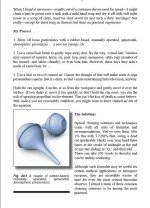Hi,
first of all it has to be said that cleaning should only happen if is really necessary - and for dirt to actually impair the view quite astonishing amounts are needed. Arduous cleaning with the wrong tools often leads to lots of micro-scratches in the coatings over time and this will impact the view and the resale value.
As a first tool a little soft brush/blower is warmly recommended to get rid of dust specks - if you can be bothered.
DO NOT USE COMPRESSED AIR FROM A CAN OR COMPRESSOR! In the best case you just get some oil from the can to the lens to get it really dirty, in the worst case your front element might crack due to temperature shock!
If you cannot blow it away and the instrument is waterproof, running tap water is recommended - if you trust the waterproofing that much you could even immerse in warm water with a bit of dish soap and very gentle circular movements with your fingertips - this is actually a recommended way to clean large metal coated first surface mirrors for astro scopes which are way more delicate than your usual anti-reflection coating on glass lenses. If you are concerned about water stains you can use distilled water or isopropyl alcohol as a last rinse.
If the instrument is not waterproof and dirt cannot be blown away, wet optical wipes or a clean soft microfiber cloth with a suitable cleaning solution can be used - as for what is suitable really depends on the coatings and what is around the glass.
Optical coatings are quite unaffected by chemicals, so most solvents are ok if they are clean and will evaporate without residue - e.g. alcohol, surgical spirit or acetone - please only use in a well ventilated place to avoid inhalation and fire damage!
There might be non-optical coatings on top of the optical ones - e.g. those for lotos effect which will be affected by solvents - in that case read the instructions which usually have a warning then or ask the manufacturer what is ok.
Also of course you can easily damage rubber armour or paint with the liberal use of solvents, so care must be taken to not bring the solvent in contact with these. There are also pre made cleaning fluids for optics available - one brand well regarded in the astronoy scene is Baader optical wonder...
Joachim




